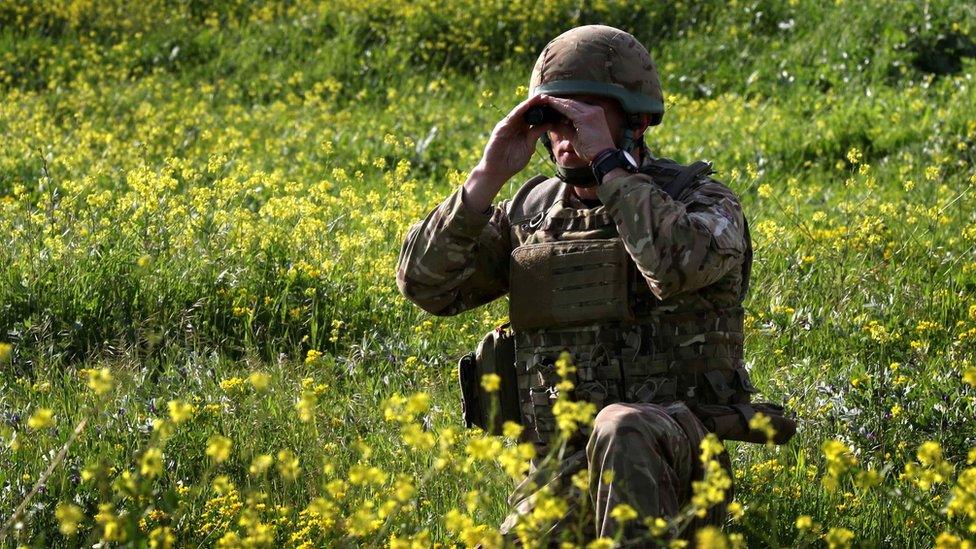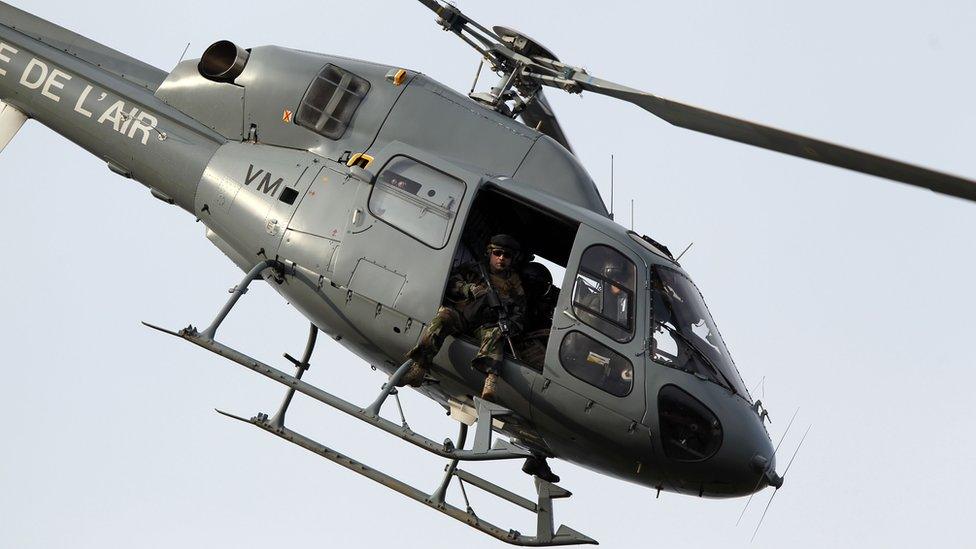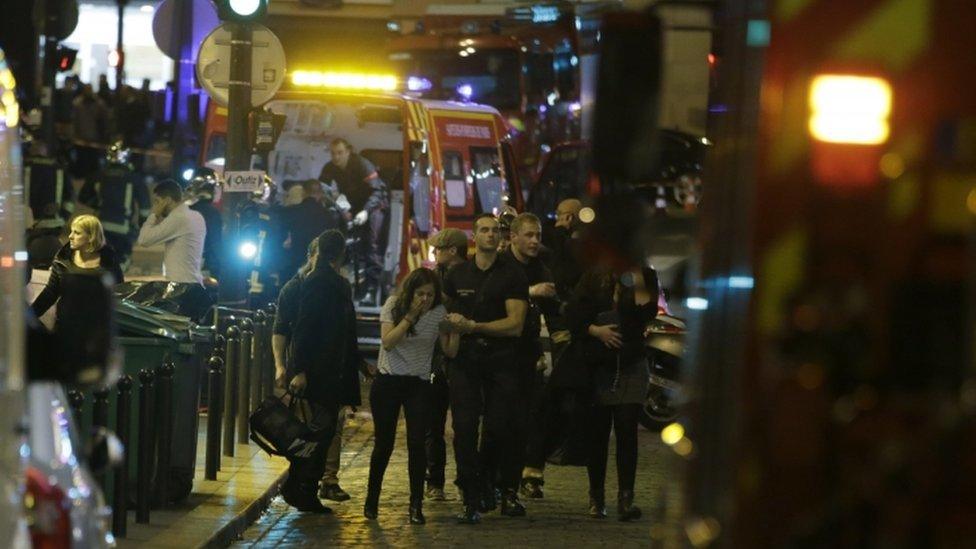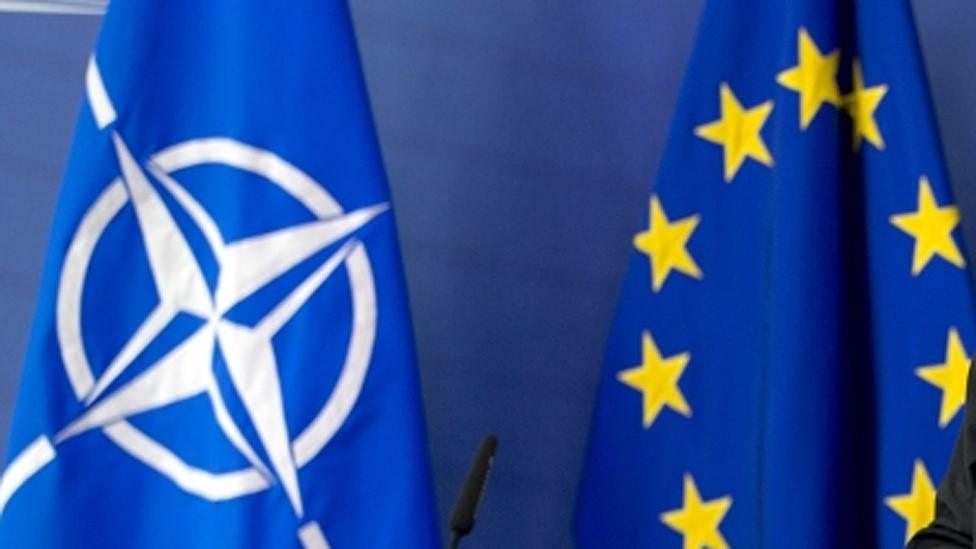Weighing up Britain's defence relationships
- Published

Downing Street might like you to think the British military establishment is firmly against Brexit.
Last month it released a letter, external, allegedly signed by 13 former generals, admirals and air marshals in support of Britain's EU membership. But it dramatically backfired.
One of the generals named, Sir Michael Rose, quickly disowned it and Number 10 was forced to issue an apology, external.
As with much of the EU debate, when it comes to defence and national security there are more opinions than hard facts. This is just an attempt to help navigate some of the issues concerning security and defence.
Nato or EU?
Even the most ardent pro-European Union supporter would admit that Nato, rather than the EU, is the bedrock of Britain's defence.

Nato has taken the lead in military operations
It is the Nato alliance that's set the target of spending 2% of the nation's GDP on defence. Within the EU, Britain has been one of the few countries to meet that goal. Most EU states have, until recently, been slashing their defence spending.
Nato has taken the lead in military operations and is responsible for the collective defence of Europe. And you don't have to be a member of the EU to be a member of Nato - think of Canada and Norway.
Nevertheless it is hard to argue that the EU has no relevance to our national security - beyond the economic security that many British defence companies are citing as a reason to stay.
There have also been a number of EU military missions. For instance, EUFOR to keep the peace in Bosnia-Herzegovina, and EUNAVFOR, external, a European naval force tackling piracy in the Horn of Africa, which, incidentally, has its headquarters in Northwood.
In terms of confronting organised crime there's Europol along with the European Arrest Warrant. The EU has also acted together as a trade bloc to impose sanctions. President Obama might take the credit for the Iran nuclear deal, but the EU too was at the negotiating table.

Last year's Paris attacks highlighted the dangers facing the EU's citizens
And yet recent history shows there are no guarantees that being part of the EU makes its citizens more safe.
For all the talk of co-operation, the attacks in Paris last year highlighted serious weaknesses. Intelligence sharing between France and Belgium, two of the EU's strongest advocates, was clearly inadequate.
And the migrant crisis has shown the free movement of people, and the lack of border controls, can carry risks as well as rewards.
Allies - EU or the US?
Britain's armed forces have shrunk dramatically. It is more dependent on its allies. Indeed it is hard to envisage the UK ever carrying out a large-scale military operation on its own again. Alliances are today more important than ever.
In Europe the most important defence relationship is with France. It is the only other EU nation that has a similar sized armed forces and defence budget and the same level of global influence.
David Cameron and Nicolas Sarkozy say the moves will save money without undermining national sovereignty
The relationship is becoming closer. As part of the Lancaster House agreement France and the UK have set up a Joint Expeditionary Force, external. The two nations are working together on the next generation of combat drone. Though this is all based on a bilateral agreement would it be harder to sustain if Britain turned its back on the EU?
But of course the most important bilateral military and intelligence relationship for the UK is with the United States. Britain talks of a "special relationship". America might view it more as "first among equals".
With a resurgent Russia the US is looking for a strong, united European response.
Lieutenant General Ben Hodges: "The UK is such an important member of the alliance"
In a recent interview with the BBC, the head of the US Army in Europe, Lt-Gen Ben Hodges, linked the health of the Nato alliance to that of the EU by warning that: "Anything that undermines the Nato alliance has an impact on us and so if the EU begins to unravel then there can't but help be a knock-on effect for the alliance also."
Many Americans see the EU as part of the fabric of Europe. Would Britain lose its influence on both sides of the Atlantic if it left? Would Washington be left asking the question once attributed to Henry Kissinger?
"What telephone number do I ring if I want to talk to Europe?"
- Published15 March 2016
